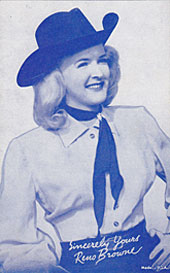 RENO BROWNE RENO BROWNE
by Guest Columnist Bob Pontes
Monogram leading lady Reno Browne, born Josephine Ruth Clarke April 20, 1921, was nicknamed after her hometown in Nevada. Reno was a popular rodeo performer in the early ‘40s, twice becoming Queen of the Reno Rodeo. Bob interviewed Reno in 1985.
BP: As a child, what were you interested in?
RB: Ballet, piano and riding. I liked horses best.
BP: How did you get into show business?
RB: I had an agent in Hollywood who was in a barbershop getting a haircut. Next to him was producer Scotty Dunlap who was looking for a girl for westerns who could ride horseback. The girl he’d hired before had fallen off the horse. My agent told him about me and I went out for the interview and got the job.
BP: What are the memories you have about making films with Johnny Mack Brown and Whip Wilson?
RB: I found those two the most gentlemanly people I have ever met. I loved Johnny Mack Brown when he played the spoons. He used to get hold of a couple of spoons and make rhythms against his leg. It was so much fun to sit around and listen to him. Whip had quite a voice.
BP: Why did you use the name Reno Blair and then Reno Browne later on?
RB: When I first signed, I was working with Johnny Mack Brown and (the studio) thought the public would think I was his daughter or something. So they made me use the name Blair. Funny though, his horse’s name was Reno, so when I changed my last name to Blair they had to change his horses’ name to Rebel.
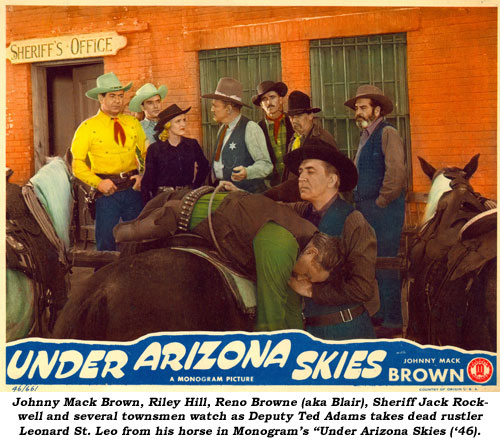
BP: How does Whip Wilson’s riding compare to Johnny Mack Brown’s?
RB: Those two were entirely different people. Johnny was more eager and knew his craft very well since he had been active in westerns and motion pictures for years. Whip was fairly new to the business but was a quick learner. When he was hired, my boss asked me to take him out for a ride to see how he did. He rode pretty well except the horse ran away from him. After that though, he had no trouble whatsoever with the horse. He was on a strange horse when he was with me and I, of course, was on my own stallion. So I can’t say he was a bad rider; although that was a funny little bit.
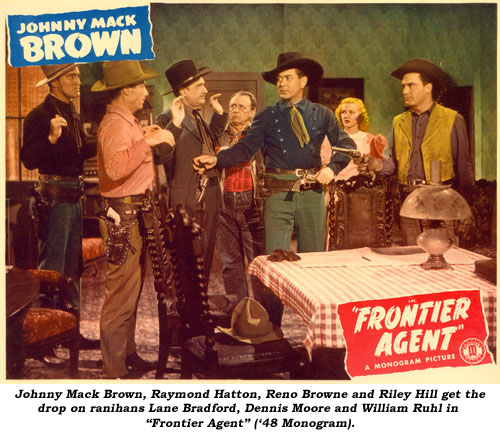
BP: What was the funniest thing that happened while you were making a movie?
RB: Once I fell off a rocking chair and dislocated my jaw. They teased me about it because I couldn’t fall off a horse, but I could fall off a tipping rocking chair!
BP: Was that the worst day of your life?
RB: No, probably the first day on the set when I was wearing big rowel spurs and my spur got caught in another horse’s stirrups. I twisted my leg and sprained my ankle. They had to cut the boot off which made me mad because they ruined a very good pair of boots.
BP: What was the best day you ever had?
RB: The start of any new picture was always good because you learned more and met new people. You learned your script and the next day everything on the script would be changed. So you didn’t really memorize the lines because you knew the next day they would give you new words. But they gave you time and worked patiently with you. We made a film in five days, or two in ten days. Sometimes you would go in a door with one outfit on and come back out and put another outfit on to go through the same door for a different picture. You didn’t know which one you were working on sometimes!
BP: You made one film with Jimmy Wakely.
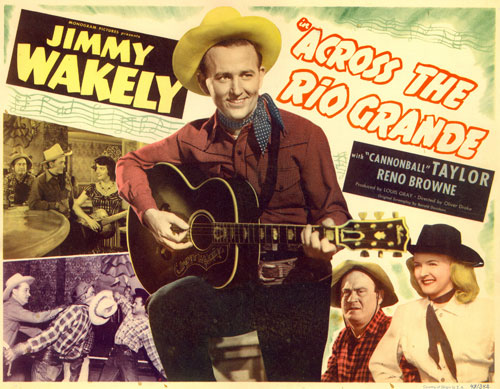
RB: Jimmy was such a quiet man with good humor and had a beautiful voice. He was very warm hearted to all he met, a grand human being.
BP: You loved the action part of filmmaking best?
RB: That was the most enjoyable. One action scene I did was to ride a horse, bend down and pick up a package from the ground.
BP: What were your favorite movies?
RB: The one I like the best is “Fence Riders” with Whip Wilson. I got to do some stunt things, and there was quite a bit of activity during the filming.
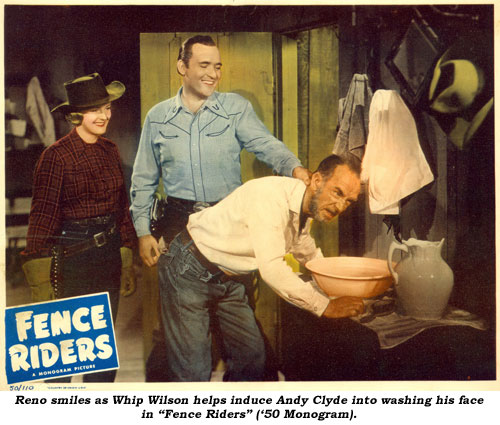
BP: Tell me a little bit about your family.
RB: I had two husbands—one was Lash LaRue. I didn’t have any children. I have stepchildren—Lash LaRue’s children by a previous marriage—they still call me Mom.
BP: Off screen, Lash didn’t try to live up to his image, did he?
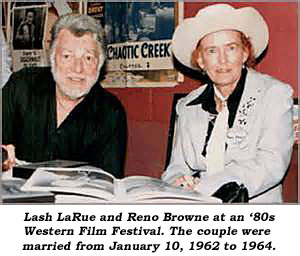 RB: Which image? Not being nasty, but he is, and was, quite a character. I’d rather not say more, and there is a lot more to say. RB: Which image? Not being nasty, but he is, and was, quite a character. I’d rather not say more, and there is a lot more to say.
BP: Have you acted in anything on TV or the stage?
RB: I had my own radio show, “Reno Rides The Range”. Whenever I was going into a new town I would send thirteen episodes of the radio show to be played before I got there. Also, I worked on several TV shows, like “Crossroads” with Darren McGavin as the leading man. It took a lot of time, going to horse shows every Sunday of the year, openings for Pacific Coast Theaters and appearing at orphanages.
BP: Why do you think Westerns are no longer popular?
RB: Because there’s very little sex in them; and, although everyone loves to see them, they were made with an extremely low budget. That is no longer possible. A picture at that time could be made for around $50,000. Today, people go to see big set movies.
BP: What have you been doing since leaving films?
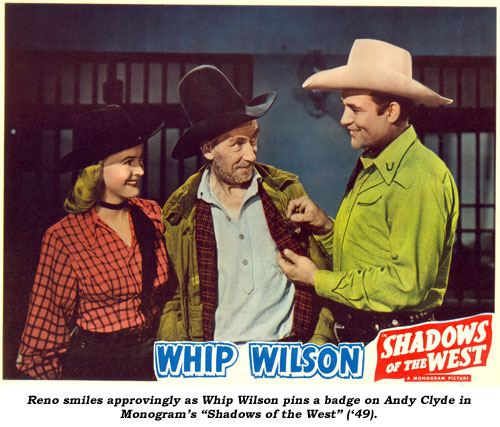
RB: I did do an awful lot of traveling. I represented the United States government at the Peruvian World Fair for three weeks. And I was presented to the King and Queen of England. Also, on a trip to Paris, France, I adopted an eight year old boy. I sent money every month to the Catholic convent for food—a wonderful experience. A good wind at your back.
Reno died May 15, 1991, of cancer. She holds the distinction of being the only B-western actress, besides Dale Evans, to have her own comic book. Marvel published three issues in 1950.
Reno’s Western Filmography
Movies: Under Arizona Skies (‘46 Monogram)—Johnny Mack Brown; Gentlemen From Texas (‘46 Monogram)—Johnny Mack Brown; Raiders of the South (‘47 Monogram)—Johnny Mack Brown; Law Comes To Gunsight (‘47 Monogram)—Johnny Mack Brown; Frontier Agent (‘48 Monogram)—Johnny Mack Brown; Shadows of the West (‘49 Monogram)—Whip Wilson; Across the Rio Grande (‘49 Monogram)—Jimmy Wakely; West of El Dorado (‘49 Monogram)—Johnny Mack Brown; Haunted Trails (‘49 Monogram)—Whip Wilson; Riders of the Dusk (‘49 Monogram)—Whip Wilson; Rangeland (‘49 Monogram)—Whip Wilson; Fence Riders (‘50 Monogram)—Whip Wilson; Gunslingers (‘50 Monogram)—Whip Wilson.
top of page |

